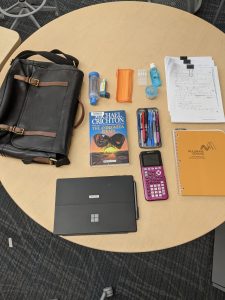

My name is Ian Lee. I work as a middle school math teacher at an independent school in West Vancouver, BC and have been working here for 6 years.
For this exercise, I chose to reveal my work shoulder bag that I carry for work purposes. I also carry a second bag, but as it only serves as a lunch bag and overflow for assessments to be marked, I have decided to only focus on my shoulder bag primarily. This photo is taken on early January, 2021.
In this bag, I hold my work essentials as a math teacher; my work computer (Surface hybrid tablet-computer) with paired stylus, agenda, student assessments, graphing calculator, and pencil case. There are several health-related items as well that I carry as necessities; my asthma puffer and aerochamber, hand sanitizer, eye-drops, a spare facemask, and over-the-counter pain medication for emergencies. An additional item unrelated to my work and health is a novel that I borrowed recently from the library, titled ‘Andromeda Strain’ by Michael Crichton.
Of all my items from my bag, I use my work computer the most, agenda, followed by my graphing calculator and pencil case. Student assessments are non-daily but occur periodically throughout the academic year; this batch represents three classes of tests my students completed prior to the holidays. My health-related items serve only for emergencies; my hope is that I do not actually need to use them at all.
- My puffer, with its health sticker slightly faded due to its frequent jostling against its walls in my shoulder bag, reminds me of my dependency on having it close to me. Its textual details identify my full name as its host, prompting my reality that I am getting older and that my peak physical condition as a swimmer was eons ago.
- My agenda serves as a resource to organize my day and week. It is filled with sporadic bursts of lists of things to do and empty spaces, as I shuffle between using a digital to-do list on my computer and a textual to-do list in this agenda.
- My collection of student assessments communicate my occupation and remind me that work and home life intertwine. As I bear the responsibility of educating my students well, the symbolic checkmark in red signifies my success (or lack of as my failure).
- My choice of leisure reading was inspired by the current events of the pandemic; the identification of an unknown biological affliction supposedly from space and the complexity (and simplicity of human responses).
Text Technologies:
The text technologies of my bag show my engagement with both written text and digital text. As a math teacher, I still depend heavily on written assessments as student proof of understanding as opposed to digitally constructed answers. Among my stack of assessments, some student work is digital; these students completed their assessments at home, but still submitted their files electronically, and I printed them out to mark. My agenda is a reminder of my constant fluctuation between depending on my digital list and written list to organize my weeks. My calculator reveals my daily interaction with symbolic text with numbers, as I work with students in understanding and engaging with their curriculum. Finally, my book of written text is my getaway from the digital world.
The health contents of my bag are usually more private, as I hesitate to share any signs of weakness despite knowing that it is not really one at all. Even though I remind myself that each person has their own health profile of pains and ailments to varying degrees, I try to tuck such information away; after all, the pandemic has pushed the quality of health into the spotlight, and any identifying factors of risk such as asthma incurs a conversational “uh-oh”.
If I look back in time to 15 or 25 years ago, I was in school. My shoulder bag would have been a backpack, my lunch would have been the biggest thing I carried, and my health items replaced with textbooks and its pages. I still would have had a good book to read, calculator, pencil case, and agenda. Remarkably, most things would have stayed the same; just the health items would have been absent.
Hi, this is a comment.
To get started with moderating, editing, and deleting comments, please visit the Comments screen in the dashboard.
Commenter avatars come from Gravatar.
Hi Ian!
I, too, carry an asthma inhaler in my bag, though only in my gym bag. You do not have to feel anxious in having it seen by students. I think some students would feel relieved to know that there are others with health conditions. There are so many students with health issues who are ashamed to be afflicted and the idea that everyone in school is healthy is dangerous; it makes us less considerate of others. Recently, I have seen a student with diabetes with a needle in the classroom, and have heard colleagues openly talk about their mental illness like it was nothing. I think these situations just educate everyone about how everyone has vulnerabilities and that we would all benefit from taking extra care of one another. I imagine that if students knew of your predisposition to asthma, they would take extra care to wear their masks and sanitize their hands around you!
Now that you mention the inhaler, I am thinking that it is a text technology too if we think about the roots of the word ‘text’ as coming from an oral activity. The inhaler is a tool that supports and enables you to create speech, which can be considered as an art form.
I also teach at an independent school in West Vancouver! Perhaps our paths will cross one day at Pro-D!
Hello Ying,
Thank you for your comments!
I am so glad to hear that you also have an inhaler! Perhaps it is the general atmosphere given COVID, as health conditions are elevated as higher risks; most of general conversations I have with my students tend to shield their individual health conditions unless asked, such as dietary or allergies. I do agree that I can model normalizing discussions and learning about each other’s individualities in a safe space, though you and I can agree that students can be quite ignorant and judgmental of each other. For the most part, my students do appreciate learning about each other’s interesting stories regarding their health, especially when it takes time away from the lesson! 🙂
I never once thought about the inhaler as a text support tool, but you are definitely right. As it supports the ability to communicate in audible form, it could certainly be categorized as speech support technology. On the humourous side, I just thought of the game “Speak Out”; where you have to wear a mouthpiece that opens your mouth wide and you need to communicate a written text message to an audience for them to understand. If an inhaler is support technology for speech, could we have inhibiting technologies too?
I hope to say hello to you one day in person!
Hi Ian,
I also commented in my post about being dependent on both digital tech and pen and paper. I prefer to use a paper planner and journal to organize my thoughts and schedule, but things like my grocery list are digital because it is useful to have a shared grocery list with my partner. We can both add things to the shared list and then if either of us goes shopping we know what is needed.
Thanks for sharing!
Hello Megan,
Thank you for your comment! I completely agree; my wife and I also vary our form of text to match the context. For instance, we communicate over dinner and write out our grocery list (eating context inspires us haha) on paper. However, when we do our grocery shopping, we end up taking a photo of our written list and share it with each other, to divide and conquer as we enter the store. It’s an odd way in blending both versions of text, but it works for us!
Thank you for your comments!
Do you think the fact that your past school bag as student and your present day school bag as teacher, reflect the fact that your personality traits have remained stable over the years? What do you think your teenage self would find the most surprising about your adult self?
Hello Deirdre,
Thank you for your comment! I would affirm that my personality traits have remained generally quite stable over the years; I used a written agenda fervently when I was younger, and also was an avid reader. Perhaps the most surprising thing that my teenage self would see in the adult version would be 1) the expected reality of age and its health changes (as all teenagers, the common thought was that we were invincible), and 2) the lingering presence of written text; I figured that by now, everything would be fully digital.
Thanks for your comments!